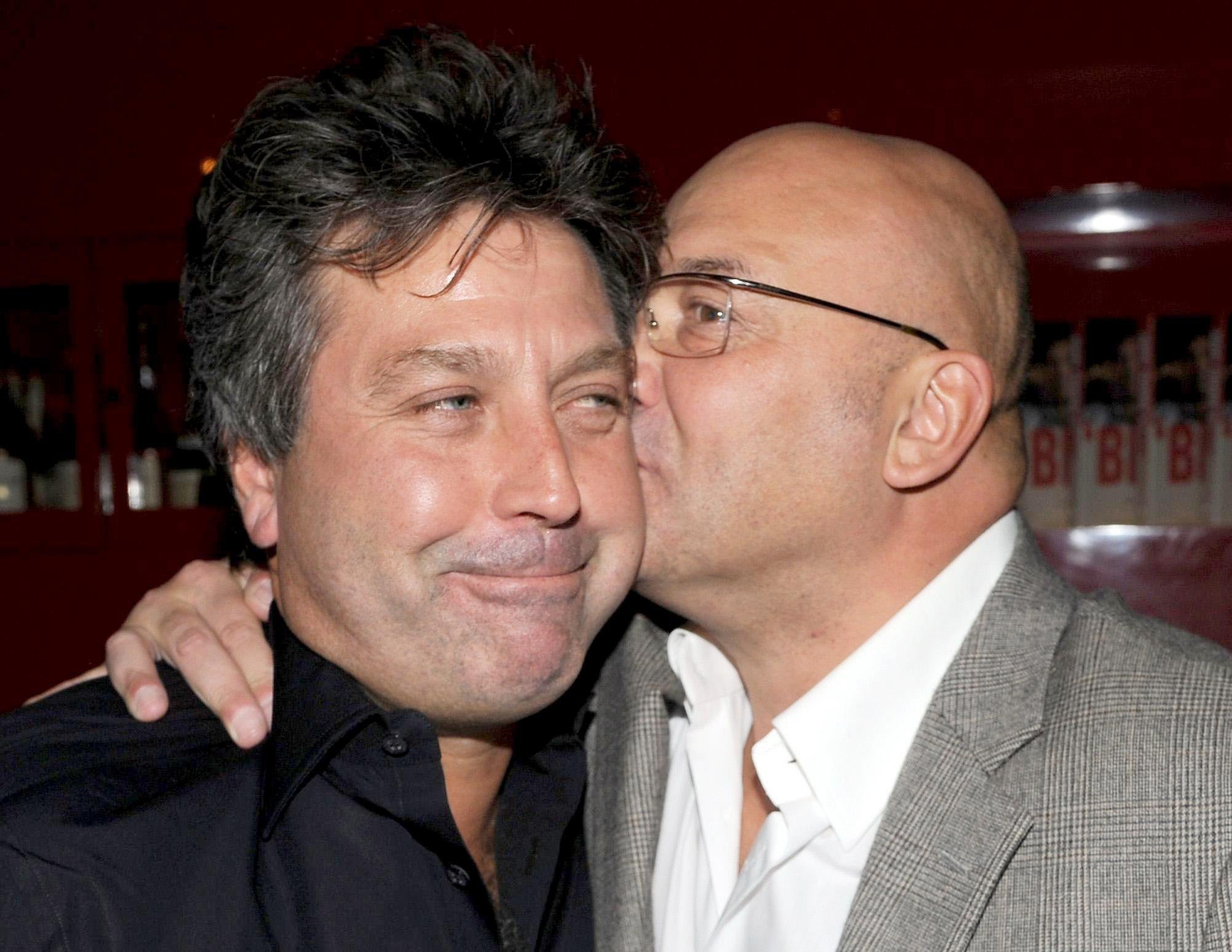Gregg Wallace was always an unlikely TV star. Prematurely bald, stout, and the proud wearer of thick glasses, he seemed destined for an unglamorous life amid the vegetable stalls of the capital, rather than on TV screens across the country. And yet, the presenter, who today has stepped back from his role as a judge on MasterChef after a series of historic sexual misconduct allegations came to light, has made himself part of the furniture at the BBC. And that makes his rapid fall from grace even more troubling for the corporation, though Wallace’s lawyers say it is entirely false that he engages in behaviour of a sexually harassing nature.
Wallace was born in Peckham, in south-east London, in 1964. The Sixties were a time when Peckham, a traditionally working-class neighbourhood with a large Afro-Caribbean population, started to be re-developed and re-energised, turning it into a vibrant, multicultural and upwardly mobile area. Yet, Wallace’s parents broke up when he was young and, by his own admission, he “lost all direction”. He left school at the age of 14, becoming an apprentice greengrocer, working at the world-famous Covent Garden Market, the mecca of British fruit and veg.
It was during his childhood in London that Wallace was sexually abused by the husband of a babysitter. He was just eight years old. “He would touch me and get me to touch him and kiss me as well,” he told the Men in Mind mental health podcast in 2023. “If by chance a young person is listening to this,” he went on, “it’s not your fault.” He first wrote about this experience of childhood sexual abuse in his 2012 autobiography Life on a Plate, and, in 2016, told ITV’s Loose Women that he felt guilty about it. “You feel like you’re playing some part in it – and of course you haven’t,” he told the panel.
But from this trauma, Wallace found an escape. Fortune smiled on the young, itinerant imp. He ended up at George Allan’s Greengrocer’s, a multimillion-pound retailer, supplying high-end restaurants from Soho to Kensington. Not only was it a profitable endeavour – it also afforded Wallace the experience and connections to, in 2010, launch Wallace & Co in Putney. But, by then, he was already a household name.
Wallace’s breakthrough as a broadcaster – a career that has run in tandem with his success in culinary fields – was kickstarted on the BBC Radio 4 show Veg Talk, in the 2000s. Co-presented with the late Charlie Hicks, Veg Talk showcased the duo as barrow boy Bourdains, lifting the lid on restaurant culture and the infrastructure that underpins the industry. In an obituary for Hicks, who died in 2018, the show was described as “ground-breaking”, and possibly Radio 4’s only ever phone-in. It ran for nine years, and though it didn’t catapult Wallace to instant superstardom, it raised his profile within the corporation that would, eventually, beam him into the nation’s living rooms.
What the producers of Veg Talk had struck on was Wallace’s everyman affability in an industry dominated by macho maestros, like Gordon Ramsay, or impudent eyefuls, like Jamie Oliver. Wallace wasn’t a pin-up – with a big bald head that seemed to take confidence from the fact that 60 per cent of his name is the word “egg” – nor a culinary savant. Instead, his relationship with food was both as a practitioner and consumer. Audiences connected with his love of eating, which is precisely why his drooling declaration about “a buttery biscuit base” became a meme in the 2010s (and the source of a UK Top 40 hit for Swedemason).
For a year in 2002 he served as presenter of Saturday Kitchen, before Anthony Worrall Thompson replaced him. But the BBC bods had bigger plans for him: in 2005 executive producers Franc Roddam and John Silver decided to relaunch the Beeb’s flagship cooking competition, MasterChef, with Wallace and John Torode, a fine dining chef, as the new presenters. The show originally ran from 1990 to 2001, with Lloyd Grossman and, later, Gary Rhodes, but the 2005 version proved even more popular with audiences.

From 2005 until this week, Wallace was the face of MasterChef. Torode, an unshowy Australian, was often tasked with the heavy-lifting of appraising the cooking, but it was Wallace’s ebullience that made him a hit with viewers. When, in 2008, the BBC decided to launch a spin-off – MasterChef: The Professionals – Torode was, quietly, kept to the home cook version. Wallace, on the other hand, sauntered over to BBC Two, where he was joined on the judging panel by, at first, Michelin-starred chef Michel Roux Jr, and, later, by top restaurateurs Marcus Wareing and Monica Galetti.
Where MasterChef was necessarily humble, its professional-focused sibling was a classier beast. And yet there Wallace was, his face smeared with a grin that only departed if the lamb was overcooked. He became a television fixture presenting a range of shows on a range of channels: Eat Well for Less? (BBC One), Time Commanders (BBC Two), Inside the Factory (BBC Two), Gregg Wallace’s Magical Christmas Market (Channel 5), South Africa with Gregg Wallace (ITV), and Big Weekends with Gregg Wallace (Channel 5). In 2014, he was a contestant on Strictly Come Dancing, paired with the brilliant Kazakh dancer, Aliona Vilani. They left the show after the first public vote.

Watch Apple TV+ free for 7 days
New subscribers only. £8.99/mo. after free trial. Plan auto-renews until cancelled

Watch Apple TV+ free for 7 days
New subscribers only. £8.99/mo. after free trial. Plan auto-renews until cancelled
“I was having a really tough time,” he told the Men in Mind podcast, of his stint on Strictly. “I was really, really stressed. So badly that the side of my face broke out into a rash, like cold sores.” It was a turbulent period for Wallace too at home. He had been married three times already, with the third of these marriages disintegrating in 2012. In 2013, he met Anne-Marie Sterpini on Twitter, as was, beginning a courtship that would culminate in a wedding at Hever Castle, the former seat of Anne Boleyn, in 2016. “You can’t chat anyone up at work because the HR department would sack you,” he told the White Wine Question Time podcast in 2020. “What I like about Twitter is that it is not a dating site.” She gave birth to their first child, Wallace’s third, in 2019.
There was a growing sense that Wallace’s cuddly, non-threatening persona might have been a useful trick for climbing the BBC’s greasy pole
Wallace had been exposed to bad press on occasions before. The Guardian deemed that his 2010 restaurant opening “wouldn’t make it even to the first round of MasterChef.” (It closed in 2014, and Wallace was forced to sell the parent company.) But it was a self-authored diary in the Telegraph Magazine from February 2024 that precipitated a flurry of negative publicity. In it, he bragged about his “18 per cent body fat” and “six-pack”, his prerequisites for having another child (“that we had help in the house… and secondly that we had at least one week a year when we holidayed just the two of us”), not to mention his strict 8pm bedtime. Critics were quick to pounce on Wallace’s hands-off approach to his four-year-old son Sid, who is non-verbal autistic, not to mention his daily two hours of Total War gaming.
In the online world, there was a growing sense that Wallace’s cuddly, non-threatening persona might have been a useful trick for climbing the BBC’s greasy pole, rather than a true reflection of his character. He became a regular feature in gossip columns, like Popbitch, where his bawdy, often inappropriate jokes had become tabloid fodder. What began as ribald column inches have, in recent weeks, grown into a more damning series of allegations against the presenter.
Back in October, Lisa Faulkner – a former Celebrity MasterChef champion and wife of John Torode – let slip about Wallace’s on-set behaviour during a talk at the Cheltenham Literature Festival. “Gregg just told rude joke after rude joke to the crew,” she told the audience. “And I’m going, ‘Please, I don’t want to hear this joke.’” After Faulkner’s comments, it was further reported that Wallace had bragged about his sex life, on set, to junior colleagues, and had allegedly been hauled into a meeting with BBC bosses in 2018 to discuss his conduct.

This week, 13 people who have worked with Wallace across a 17-year period have set out allegations against him. Among them is Kirsty Wark, the veteran BBC political presenter, who appeared as a contestant on Celebrity MasterChef in 2011, where she reached the final. “He used sexualised language in front of a number of people,” she told the BBC. “I think people were uncomfortable.” It has since been confirmed that Wallace has stepped away from presenting MasterChef while these allegations are investigated, while his presence across the busy Christmas schedule must now be in jeopardy.
This latest investigation has been conducted by BBC News (MasterChef’s production company Banijay UK has also launched an investigation and said Wallace is co-operating), but there will be questions, yet again, about why it has taken the BBC six years, since allegedly being made aware of similar accusations, to act. For some time, Wallace’s alleged behaviour has been an open source of gossip – but, as with so much sexual misconduct within the TV industry, it has been dismissed as “banter”, the word often used to trivialise these sorts of workplace indiscretions.
It is an unedifying saga, just months after the Huw Edwards fallout and then the Strictly bullying scandal, that will call into question the safeguarding on BBC sets and the fact that perpetrators of harassment are, so often, hiding in plain sight. While Wallace with his jaunty personality, his unthreatening masculinity and avuncular on-screen persona, might not have seemed, to viewers, like a worrying presence, the reporting mechanisms that ought to have curtailed his behaviour have proved wholly unfit. Pressure will only mount for purposeful action that will, almost certainly, bring to an end the career of one of the BBC’s most recognisable faces.

